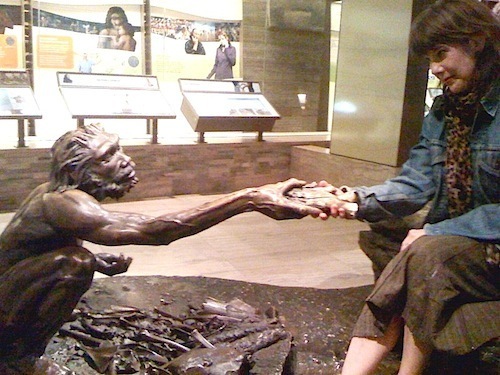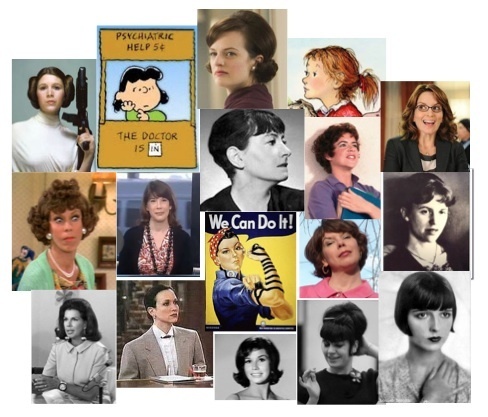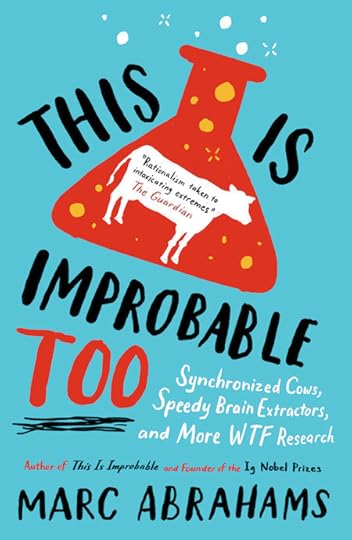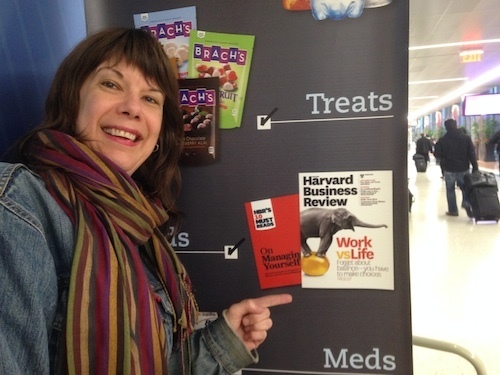Robin Abrahams's Blog, page 5
November 30, 2014
Today’s column: Call nine-wine-wine edition
Today’s column is online here. The second question is from a “grandma” who is concerned that her daughter is too tense and raises her voice too much with the “cuties.” What should grandma say?
I should have used this question in my exams back when I was teaching psychology, because if you don’t immediately realize that the daughter’s tension is probably connected to her mother’s presence and reduces as soon as Grandma goes back home, you weren’t paying attention. It’s called the Hawthorne Effect: Observing a behavior can change that behavior.
The first question is from a couple who regularly get inveigled (I don’t regularly write “inveigled,” so that there was a real thrill) into picking up the tab for another couple’s pricey wine habit. They just needed someone to officially let them off the hook from their excessive notions of hospitality and fear of seeming cheap, so I did that. I hate when people feel guilty or ashamed for spending their money in accordance with financial reality and their personal priorities.
Incidentally, did any of you happen to hear this story when it broke–the guy who ordered a bottle of wine for “thirty-seven fifty” that turned out to cost $3,750? Better call Saul!
November 28, 2014
Scheduling problems
A friend of mine posted on Facebook earlier this week,
Why do all the theater companies in Greater Boston do all their “family friendly” stuff in November and December? Most of it isn’t even holiday-related. Don’t they know there’s a vast expanse of time from January to May, which is when families actually have time and are looking for stuff to do?
What a great question! Theater companies ought to take it under consideration. So should you, as the artistic director of your own life, when you’re making social plans. Everyone’s booked solid in December, and then come long, dark January and February, with no real holidays and no special events and very few people traveling. Those are great months to throw parties! Don’t send your invites until after Christmas, though, or they’ll disappear into the general slush pile.
November 27, 2014
Thanksgiving
I asked another tourist to take this picture for me at the Smithsonian National Museum of Natural History when we visited D.C. earlier this fall. The Human Origins wing has truly beautiful sculptures of early hominims, including this one of a homo heidelbergensis posed on the floor, so that you can be photographed with him. That right there, simple as it is, is fantastic science theater.
Happy Thanksgiving. Be grateful to your ancestors.
November 26, 2014
And especially, Tyrion
Do you have a Kindle? What do you think of it? (We’re getting to Tyrion, really.)
I only use mine for travel, because I tend to forget, instantly, anything I read on it. Straight into the memory hole it goes. Am I alone in this? Reading on a Kindle doesn’t involve the physical acts of handling a book, feeling the quality of the paper on your fingers, noting the typeface. You don’t put a well-loved Kindle book on a shelf in your home, where it sparks a brief recollection every time you see it. For me, anyway, physical engagement with a paper-and-ink book drives the language and ideas that much deeper into my mind.
It took me a while to figure this out. Now I only download public-domain classics and guilty-pleasure kinds of things, for the most part. I did read the “Game of Thrones” books on my Kindle, because one, I obviously wasn’t going to schlep 20 pounds of Machiavellian saga with me everywhere we went, and two, the HBO series keeps me from forgetting the story exists.
And while reading it, I remembered the existence of another book, one of my recent favorites, Andrew Solomon’s Far From the Tree, which lives on my Kindle and hence not in my memory.
Far From the Tree is about children who, as “apples,” do indeed fall “far from the tree,” by being fundamentally different from their parents in some crucial way. What is the nature of the difference, and how does it affect family relationships? Solomon writes about transgendered folks, the criminal children of law-abiding parents, prodigies, schizophrenics … and dwarfs.
So of course I had to reread that chapter. “All dwarfs are bastards in their fathers’ eyes,” says Tyrion. The first and most obvious tragedy of Tyrion’s life is his horrifying mistreatment at the hands of his family, followed by the sad fact that he is an exceptionally romantic and lustful man, with a face and body that does not inspire reciprocal feelings in the ladies.

This dude would do okay with the ladies. Peter Dinklage is handsome. Tyrion Lannister, per the books, is quite hideous: patchwork hair, mismatched eyes, and his battle wound didn’t sexily highlight his cheekbones, it halved his nose. The show also pulls way back on the extent of Sandor Clegane’s burn scars, but never mind. And don’t even get me started on those lame-ass “direwolves” cough*German shepherds*cough*.
Solomon doesn’t note this explicitly, but one of the fascinating aspects of the dwarf chapter is the extent to which dwarf bodies are associated with entertainment. From court jesters to P.T. Barnum to dwarf-tossing, dwarfs have been associated with show business, with laughter and clowning. I don’t think any other disability or physical difference has that association. Dwarfism is a highly visible difference without an accompanying disability*, which keeps dwarfs constantly on display without any moderating sympathy. Dwarfs live in the spotlight.
Many people like to be in the spotlight, of course, and people who spend a lot of time in it often get very, very good at being there, and it’s fun to do stuff you’re good at. This puts dwarfs who want an entertainment career on their own terms in a difficult position. Tyrion’s noble birth precludes him from becoming a court jester, a career he would have excelled at (trenchant and witty, he’s the Jon Stewart of Westeros). In the books, at least, he had become a good tumbler and floor gymnast, but his father believed such capers were beneath the dignity of a Lannister. (How can we even talk about dwarfs without prejudice when our very language is structured around concepts of big versus small, above versus below?) The loathsome Joffrey brings in dwarf clowns who “joust” while riding pigs and dogs to entertain his wedding guests, which sparks a brutal series of power plays between him and Tyrion.
An NPR story on Peter Dinklage reports: “‘He knows he has no skills with the sword,’ Dinklage says, ‘and this is a world that is really deeply violent. Military rules. He would not be able to survive in that world, given his own strength. So he beats people to the punchline — he’s entertaining.’”
Yet look how convoluted Tyrion’s relationship to his own “entertainingness” is. Tyrion is naturally witty. He becomes even more witty by being constantly in the spotlight. He uses his wit as a way to be accepted, to defuse conflict, to prove his value. At the same time he can’t allow that wit to make him seem even more amusingly inconsequential in the eyes of big people, he can’t allow himself to become merely “that funny little man” and nothing else. In the books, at least, Tyrion’s wit occasionally (more than occasionally) gets him in trouble, and the reader feels that this is to some extent the point. Tyrion’s tongue is his only weapon, and a truly good weapon poses some danger even to its owner.
This is part of the tyranny of prejudice–the way it causes people to second-guess their own nature. The self-consciousness that never goes away.
*Achondroplastic dwarfism, though not a disability per se, does come with a range of skeletal and organ vulnerabilities. That’s is part of the reason I’m on board with this theory–Tyrion must be part magical, or he’d be crippled if not dead from the various physical traumas he’s suffered.
November 23, 2014
Sunday column: Holidays coming and commas, matter, edition
The subhead to today’s Letters section reads, “Readers respond to a story of a 91-year-old’s return to dating and Miss Conduct.” That … really gives people the wrong impression of my social life these days, I fear.
Today’s actual column is here, and features some gift-giving advice:
… as we move into the gift-giving season, those of us who have gift-able skills–tailors, pastry chefs, massage therapists, copy editors–should always be upfront with friends and family. Our labor and its fruits can be part of the everyday warp and weft of friendship–or it can be done for cash or barter–or given as an official gift, as you intended. But it’s on us to communicate our expectations in advance.
Do you need holiday advice? Write to me today at missconduct@Globe.com!
If you need holiday advice tonight, tune in to WBZ NewsRadio at 10:15 p.m. –I’ll be doing a call-in segment with host Dean Johnson.
And if you don’t mind filtering through a whole bunch of buzzy graphics to get your advice, check out this holiday etiquette “quiz” I did for BU Today.
Are you feeling in the spirit yet, people? I know I am. Going on vacation during the first two months of November is odd. We left the day after Halloween, spent most of our time in warm, sunny Arizona, and then came back to a chilly town all decorated for Christmas. It feels like we skipped forward by a couple of months.
November 21, 2014
Why this ferret matters
30 seconds of a ferret trying to work up its courage to take a giant leap, h/t Gawker.
It’s a little Friday Ferret Funtime for all my readers, but if I can geek out for a minute, the fact that you’re laughing is what I’m all about. This is why I spend my life reading and writing and talking about psychology and theater. Ferrets and humans are different species with very different bodies and brains. And yet, you know exactly what this little guy is experiencing, don’t you? You know. There is something universal about motivation and the body language we–ferret, dog, human, whatever–use to express our complicated relationship with it. You’re not laughing at this ferret because what it’s doing is incomprehensible and weird. You’re laughing at the familiarity. It’s your kid at bat. It’s you before a job interview. It’s me at my first Open Mic Night.
We are all this ferret.
UPDATE: A friend of mine noted “this reminds me of pursuing a career in the arts.”
November 20, 2014
“Game of Thrones” and looks-ism
I did take the “Game of Thrones” books on my vacation, and enjoyed them greatly. Our vacation was a peripatetic one–Albuquerque, Santa Fe, Petrified Forest, Grand Canyon, Flagstaff, Sedona, Prescott, Phoenix, Lake Havasu, Las Vegas–so it was nice to stay in one fictional world the entire time. While dragons and White Walkers had their appeal, what I primarily enjoyed was the books’ intense psychological realism.
“Game of Thrones”* is about playing the cards you get dealt in life. Except for its RenFest trappings, it’s not the slightest bit mythological or fantastic. It’s much more like “The Good Wife” or “Mad Men” at heart: people trying to assert their individuality and gain power in a world that may or may not welcome such efforts. (“I’m Daenerys Targaryen, and I want to smoke some marijuana.”)
One of the cards we get dealt in life is our physical appearance. Looks-ism and body discrimination is a major thing with me, as many of you know, and the way characters like the dwarf Tyrion or the sexually ambiguous Brienne of Tarth get treated will make your blood boil like R’hllor never dreamed. But there is so much more going on than simple discrimination against the different or ugly. Martin is wise enough, for example, to know that beauty intersects with power: Beauty can increase the power of a woman who is already privileged, like Cersei, but beauty is a terrible liability to women who have no power, like Sansa. Sansa, and Dany, are constantly being creeped on by men whom they have little choice but to tolerate. The ordinary-looking Arya, by contrast, can disguise herself as anything from a boy to a crippled beggar maid.
Our looks can advantage or disadvantage us in many ways:
Do you look like what you are?
Do you look like the other members of your family?
Do you look like many other people, or are you visually distinct?
The answers to these questions have life-changing power in the world of GoT, and in our world as well.
This is what I mean about looking like who you are:
Two pictures of me, surrounded by many, many awesome role models for me. I wrote about this on Already Pretty:
I’ve been thinking a lot this week about appearance privilege. As a moderately attractive, medium-sized, slender brown-haired white ladyperson, I have never been profiled maliciously. I have very rarely even been profiled inaccurately. My physical type is our culture’s default setting for the Smart Nice Girl. From Fern Arable to Laura Ingalls to Mary Richards to Veronica Sawyer to Coco Chanel to Liz Lemon, I have never lacked for positive images of women who looked like me. My appearance has made it easier, not harder, to be taken seriously as an intellectual, as a professional, as a member of my chosen religious community. Women who look like me are the girl next door, the sensible wife, the breaker of glass ceilings, the comedienne, the thinking man’s sex symbol. There is little-to-nothing about my appearance that anyone would take as physically or psychologically threatening.
I could be far more beautiful than I am, but I don’t think it would make life any easier. My husband is quite a nice-looking man, but no Chris Pratt, and for a science comedian? That’s fine. You don’t want Chris Pratt telling youwhat happened when they did an MRI on a dead salmon. You want him deeply misunderstanding the nature of the Grand Canyon.
(I, on the other hand, pretty much am April Ludgate, and she’s right. You just can’t be annoyed at the Grand Canyon, no matter how much you try. And notice that she is also a slender, pretty-not-gorgeous white-skinned brown-haired ladyperson like myself.)
November 19, 2014
Open Door Theater (Guest Post)
Reader Alison Waters-Short wrote to me after my post on the autism-friendly production of “The Lion King” to tell me about an accessibility-focused theater group that she’s involved with. I asked if she’d be willing to write a guest post on the topic, and she agreed. Here it is. Check out Open Door Theater, everyone, and thank you, Alison!
Bringing Theater to Everyone – Locally
Autism-Friendly Performance. Sensory-Friendly Film. Making entertainment accessible to audiences is the new thing, but how does that translate locally? And what about participating in the entertainment, not just watching it?
Major kudos go out to the recent autism-friendly performance of “The Lion King” in Boston that Robin wrote about recently. And to others such as Wheelock Family Theatre as well. Today, though, I want to tell you about another theater group you may have never heard of, right in Boston’s backyard.
Open Door Theater of Acton was founded in 1980 by two women who met at the bus stop, waiting for their kids. Between them, they wanted create a community theater organization with “open doors” for anyone, especially those who might not normally get the chance to participate in theater.
The early shows were a bit rag-tag, with cardboard sets painted by a local social group for people with disabilities and volunteers from a local nursing home. The sets could (and did) travel – but then again, they had to, as there was no storage for the group in the performance space! Now Open Door mounts one big musical per year, staged at the Acton-Boxborough junior high. Cast members often number over 100, bringing together families and people of all abilities on stage with boisterous, talented performances.
Throughout its evolution, Open Door has found ways to involve people on stage and off stage with all ranges of physical and cognitive challenges (e.g. actors and stage hands with autism-spectrum, spinal bifida, neurotypical, blindness, brittle bone disease, Down’s syndrome). Our most veteran player is a remarkably differently-abled woman who started on stage, has become an indispensible “Girl Friday” backstage, and now also serves on our board of directors.
These were the people that our founders wanted to “open doors” for. We were – and are! – proud to focus on people’s abilities, not disabilities. We welcome them into our theater family and give them support as a community to put their best foot forward. And like every family, ours has special traditions. Like doing the hokey-pokey together before every performance. When I joined Open Door in 2004, I didn’t know what to make of that. But now – watching the cast play together, across all boundaries that might otherwise separate them outside of the theater, is what I look forward to every year.
We’ve been dedicated to this inclusive mission since our founding. Then, in 2006, our music director asked for an ASL-interpreted performance so that his Deaf brother and sister-in-law could enjoy it. His question triggered the realization that while we had spent a lot of time reaching out to include people in our cast and crew, we hadn’t done anything for our audiences. We found ASL interpreters to partner with, and have had an ASL-interpreted performance every year since.
In 2013 our director suggested that adding an autism-friendly performance, as they had done on Broadway, would be a great fit with our mission. So we found a group to help us learn how to put one on, succeeded beyond our expectations, and then last year we did the same for an audio-described performance for the visually impaired. This year we are continuing to expand our ASL/audio inclusion by partnering with Children’s Hospital Audiology Outreach on an exciting new project to make participating in our show more accessible to students with hearing impairments, which in turn will likely bring more interest in our ASL-interpreted performance.
With some extra effort and thought, one step at a time, we have now evolved the Open Door mission to extend accessibility to our audiences as well as our participants.
It’s amazingly easy and hard at the same time to bring people together like this. Sometimes it seems to just happen organically, seeing the range of people who might otherwise not wave hello on a street come together to create a performance. Of course, it’s also a lot of hard work and planning. Providing buddies. Organizing scenes to consider everyone’s abilities. We do it because we believe that theater is for everyone, and the theater family can include us all.
And, speaking as someone who was in the cast of our very first autism-friendly performance, I tell you it was absolutely magical. Was it different? You bet. In a fabulous way. We could tell what we were doing was appreciated and enjoyed, and at the same time, it provided the cast and crew with a personal, meaningful connection to autism awareness that many of us had not previously had.
All that makes us sound like the only thing Open Door does is focus on special needs, and to be honest, as much as that is true, at the same time, it really couldn’t be farther from the truth. Open Door is about creating fantastic family-oriented theater productions that happen to be accessible to many cast members, crew members, and audiences. We create beautiful theater that seamlessly blends all this together.
When I look at all the families acting and playing together, when I see all these people backstage enjoying each other and making new friends…that’s why we do this. It’s not really magic. Like the best of entertainment, we work hard to make it look that way, and then we get to participate in the result as well. But it’s completely possible for other groups to do this, too – and I hope there are other local groups who do, or will. After all, everyone has something to contribute, and everyone needs a place to feel special and a part of a family. That’s what Open Door is really all about.
Well, unless the hokey pokey is really what it’s all about. And if so, we’re still set.
Open Door Theater’s next show is “Shrek The Musical.” Auditions are December 1-4, 2014 and performances are March 20-29, 2015. Please consider checking us out.
November 18, 2014
Improbable readings Wednesday at MIT!
Got plans Wednesday night? Join Mr. Improbable, biomedical researcher Chris Cotsapas, and science journalists Cara Giaimoand Michael Greshko for some dramatic readings of improbable science reports at the MIT Bookstore at 292 Main Street in Cambridge. The event starts at 5:30. We’ve done several of these readings and they’re quite fun. All the studies we’ll be reading from have won Ig Nobel Prizes or been written about in Mr. Improbable’s new book, This Is Improbable, Too.
November 17, 2014
Sunday column: Day late but with extras!–edition
We got back from our excellent vacation through the Southwest yesterday. It was a slightly epic day of travel and travel hangover–it feels like we’ve been gone two months, not two weeks–but here, albeit delayed, is yesterday’s column. It’s a three-fer! How to deal with endless requests to contribute to friends’ charity drives, Kickstarter campaigns, and the like; putting on lipstick at the table; and how to thank someone without coming off like you’re tipping them. The classics.
Also, I did a special column on workplace etiquette and career planning, here.
The business one was fun because I my other job is at Harvard Business School, researching and writing about career planning, self-presentation, and the like. My boss and I got the cover story in Harvard Business Review in March with a piece on work-life balance. When Mr. Improbable and I were coming home yesterday, we saw a banner ad outside the airport newsstand featuring a picture of that very HBR!
It was the cosmos sending me a message, I know it. “Vacation is over! Back to work!”
Robin Abrahams's Blog







